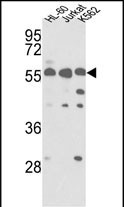PICK1 (PRKCABP) Antibody (C-term)
Purified Rabbit Polyclonal Antibody (Pab)
- 产品详情
- 文献引用 : 1
- 实验流程
- 背景知识
Application
| WB, E |
|---|---|
| Primary Accession | Q9NRD5 |
| Other Accession | Q9EP80, Q62083, Q4R7Q5, Q2T9M1 |
| Reactivity | Human, Mouse |
| Predicted | Bovine, Monkey, Rat |
| Host | Rabbit |
| Clonality | Polyclonal |
| Isotype | Rabbit IgG |
| Calculated MW | 46600 Da |
| Antigen Region | 286-316 aa |
| Gene ID | 9463 |
|---|---|
| Other Names | PRKCA-binding protein, Protein interacting with C kinase 1, Protein kinase C-alpha-binding protein, PICK1, PRKCABP |
| Target/Specificity | This PICK1 (PRKCABP) antibody is generated from rabbits immunized with a KLH conjugated synthetic peptide between 286-316 amino acids from the C-terminal region of human PICK1 (PRKCABP). |
| Dilution | WB~~1:1000 E~~Use at an assay dependent concentration. |
| Format | Purified polyclonal antibody supplied in PBS with 0.09% (W/V) sodium azide. This antibody is prepared by Saturated Ammonium Sulfate (SAS) precipitation followed by dialysis against PBS. |
| Storage | Maintain refrigerated at 2-8°C for up to 2 weeks. For long term storage store at -20°C in small aliquots to prevent freeze-thaw cycles. |
| Precautions | PICK1 (PRKCABP) Antibody (C-term) is for research use only and not for use in diagnostic or therapeutic procedures. |
| Name | PICK1 |
|---|---|
| Synonyms | PRKCABP |
| Function | Probable adapter protein that bind to and organize the subcellular localization of a variety of membrane proteins containing some PDZ recognition sequence. Involved in the clustering of various receptors, possibly by acting at the receptor internalization level. Plays a role in synaptic plasticity by regulating the trafficking and internalization of AMPA receptors. May be regulated upon PRKCA activation. May regulate ASIC1/ASIC3 channel. Regulates actin polymerization by inhibiting the actin-nucleating activity of the Arp2/3 complex; the function is competitive with nucleation promoting factors and is linked to neuronal morphology regulation and AMPA receptor (AMPAR) endocytosis. Via interaction with the Arp2/3 complex involved in regulation of synaptic plasicity of excitatory synapses and required for spine shrinkage during long-term depression (LTD). Involved in regulation of astrocyte morphology, antagonistic to Arp2/3 complex activator WASL/N-WASP function. |
| Cellular Location | Cytoplasm, perinuclear region {ECO:0000250|UniProtKB:Q9EP80}. Membrane {ECO:0000250|UniProtKB:Q9EP80}; Peripheral membrane protein {ECO:0000250|UniProtKB:Q9EP80}. Membrane {ECO:0000250|UniProtKB:Q62083}; Lipid-anchor {ECO:0000250|UniProtKB:Q62083}. Postsynaptic density {ECO:0000250|UniProtKB:Q9EP80}. Synapse, synaptosome {ECO:0000250|UniProtKB:Q9EP80}. Cytoplasm, cytoskeleton {ECO:0000250|UniProtKB:Q9EP80}. Note=Also membrane-associated, present at excitatory synapses. {ECO:0000250|UniProtKB:Q9EP80} |
| Tissue Location | Ubiquitous. |
For Research Use Only. Not For Use In Diagnostic Procedures.

Provided below are standard protocols that you may find useful for product applications.
BACKGROUND
PDZ domain, but not the AH domain, of PICK1 interacts with the C termini of the GTP-bound forms of ADP-ribosylation factor-1 (ARF1) and ARF3. The interactions with ARF5 and ARF6 are weak, suggesting that the PICK1 interaction is specific for class I ARFs and that it may regulate Golgi-to-endoplasmic reticulum vesicle transport. The PDZ domain of rat Pick1 interacts with the last 10 amino acids of the short C-terminal alternative splice variants of AMPA receptor subunits. It has thus been proposed that E-S-V/I-K-I, a sequence found in these 10 amino acids, is a novel PDZ-binding motif. PRKCA phosphorylates Pick1 efficiently but binds Pick1 in both the phosphorylated and unphosphorylated states. Consistent with a neuronal role for PICK1, the mouse homolog interacts with mouse AMPA glutamate receptors and colocalizes at excitatory synapses in the brain. Metabotropic glutamate receptor-7 (mGluR7) localizes specifically to presynaptic active zones. The extreme C-terminal 3 amino acids of mGluR7 have been shown to interact with the PDZ domain of PICK1. Immunofluorescence microscopy demonstrated that both proteins are localized at excitatory synapses in hippocampal neurons, with clustering of mGluR7 at synapses requires PICK1 C-terminal PDZ-binding residues. Mutant mGluR7 lacking the PDZ-binding residues localized diffusely along axons rather than at the synapse, suggesting a role for Pick1 as a scaffolding molecule at presynaptic sites.
终于等到您。ABCEPTA(百远生物)抗体产品。
点击下方“我要评价 ”按钮提交您的反馈信息,您的反馈和评价是我们最宝贵的财富之一,
我们将在1-3个工作日内处理您的反馈信息。
如有疑问,联系:0512-88856768 tech-china@abcepta.com.






















 癌症的基本特征包括细胞增殖、血管生成、迁移、凋亡逃避机制和细胞永生等。找到癌症发生过程中这些通路的关键标记物和对应的抗体用于检测至关重要。
癌症的基本特征包括细胞增殖、血管生成、迁移、凋亡逃避机制和细胞永生等。找到癌症发生过程中这些通路的关键标记物和对应的抗体用于检测至关重要。 为您推荐一个泛素化位点预测神器——泛素化分析工具,可以为您的蛋白的泛素化位点作出预测和评分。
为您推荐一个泛素化位点预测神器——泛素化分析工具,可以为您的蛋白的泛素化位点作出预测和评分。 细胞自噬受体图形绘图工具为你的蛋白的细胞受体结合位点作出预测和评分,识别结合到自噬通路中的蛋白是非常重要的,便于让我们理解自噬在正常生理、病理过程中的作用,如发育、细胞分化、神经退化性疾病、压力条件下、感染和癌症。
细胞自噬受体图形绘图工具为你的蛋白的细胞受体结合位点作出预测和评分,识别结合到自噬通路中的蛋白是非常重要的,便于让我们理解自噬在正常生理、病理过程中的作用,如发育、细胞分化、神经退化性疾病、压力条件下、感染和癌症。






